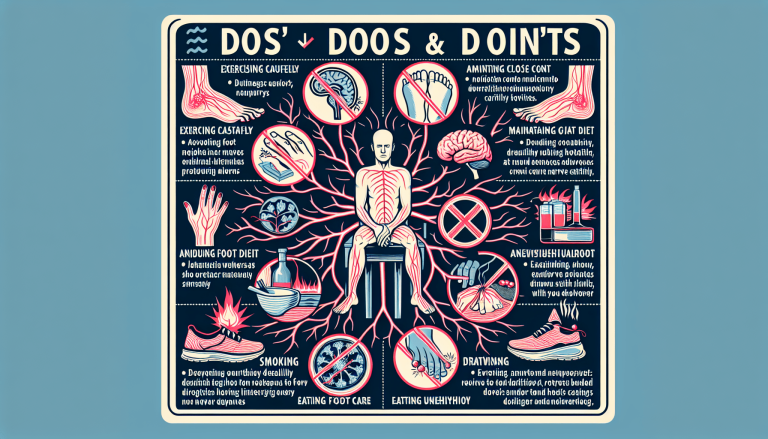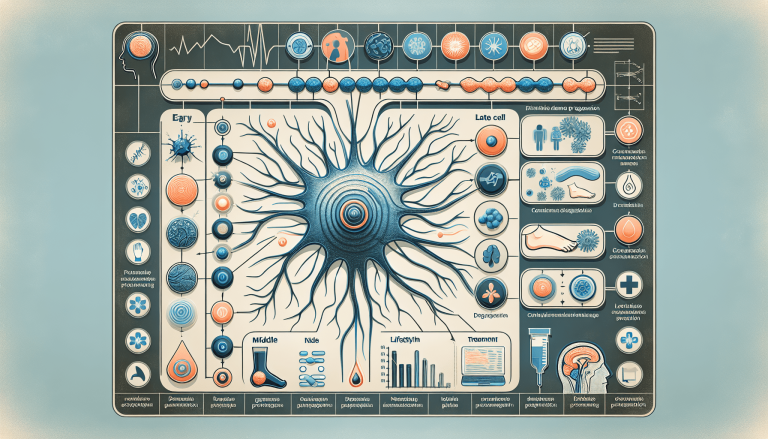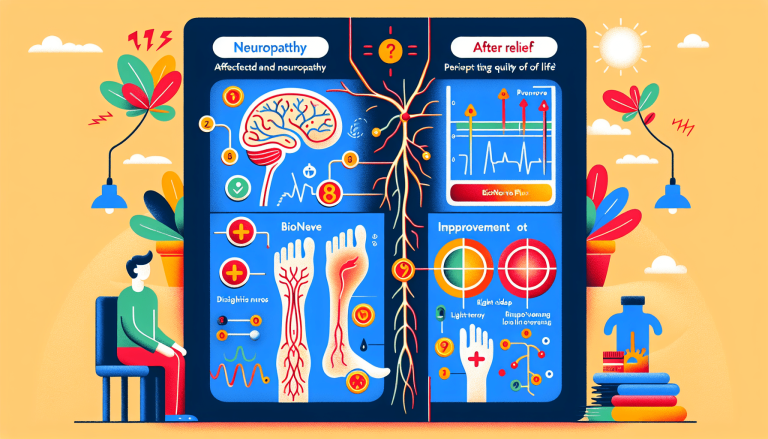What Happens If Neuropathy Is Left Untreated?
Neuropathy, a condition characterized by nerve damage, is a common health issue that affects many individuals. From tingling and numbness to sharp pain and muscle weakness, the symptoms associated with neuropathy can be disruptive and distressing. But have you ever wondered what happens if this condition is left untreated? In this article, we will explore the potential consequences of neglecting neuropathy and shed light on the importance of seeking timely medical intervention to mitigate its impact on your overall well-being. So, sit back, relax, and discover the potential risks of leaving neuropathy untreated.
Increased Pain and Discomfort
Progressive Nerve Damage
If neuropathy is left untreated, the condition can lead to progressive nerve damage. Nerves carry important messages between the brain and various parts of the body, allowing for normal sensation and motor function. When these nerves become damaged, it can result in increased pain and discomfort. Initially, you may experience tingling or numbness in your extremities, such as your feet and hands. As the neuropathy progresses, the pain can become more intense and debilitating.
Heightened Sensitivity to Pain
Untreated neuropathy can also cause heightened sensitivity to pain. Everyday activities that were once painless may now trigger intense discomfort. This increased sensitivity can greatly impact your quality of life, making simple tasks like walking or wearing shoes an agonizing experience. The constant pain can also lead to sleep disturbances, as finding a comfortable position becomes a challenge.
Chronic Pain and Discomfort
Without proper treatment, neuropathy can result in chronic pain and discomfort. This ongoing pain can be debilitating and significantly affect your ability to perform daily activities. Tasks that were once effortless now become arduous, leading to frustration and decreased quality of life. Chronic pain may also lead to changes in mood and emotional well-being, exacerbating the negative impact of neuropathy.
Decreased Quality of Life
Left untreated, neuropathy can have a profound impact on your overall quality of life. The pain, discomfort, and limitations caused by neuropathy can greatly restrict your ability to engage in activities you once enjoyed. The constant pain and loss of mobility can lead to feelings of frustration, isolation, and depression. It is essential to seek appropriate treatment to manage neuropathy symptoms and preserve your overall well-being.
Loss of Motor Function
Muscle Weakness
When neuropathy is left untreated, it can result in muscle weakness. The nerves that control muscle movement can become damaged, leading to a gradual loss of strength. Tasks that were once effortless, such as lifting objects or maintaining balance, may become increasingly challenging. Muscle weakness can significantly impact your ability to perform daily activities and may require the use of assistive devices or adaptive strategies to maintain independence.
Loss of Coordination
Untreated neuropathy can also cause a loss of coordination. Nerve damage can disrupt the signals sent from the brain to the muscles, resulting in difficulty coordinating movements. Coordination problems may manifest as difficulty with fine motor skills, such as writing or buttoning clothes, or gross motor skills like walking or climbing stairs. The loss of coordination can increase the risk of falls and accidents, further diminishing your overall functionality and independence.
Difficulty Walking
Neuropathy can make walking increasingly challenging when left untreated. As the nerves responsible for proprioception and balance are affected, maintaining a steady gait can become difficult. You may experience instability, imbalance, or a sensation of your legs giving way. The fear of falling may cause you to limit your mobility, leading to reduced physical activity and further muscle weakness.
Impaired Balance and Stability
The loss of balance and stability is a common consequence of untreated neuropathy. As the nerves that provide feedback for balance become damaged, you may experience difficulty maintaining an upright posture or have a sensation of being off-balance. Impaired balance can increase the risk of falls and injuries, making daily activities even more challenging. It is crucial to address these issues promptly to prevent further complications and maintain your safety.

Development of Foot Ulcers
Loss of Sensation
If neuropathy remains untreated, it can lead to a loss of sensation in the affected areas. This loss of feeling is particularly common in the feet, as the nerves responsible for detecting touch, temperature, and pain can be damaged. Without proper sensation, you may not notice injuries or irritations on your feet, such as blisters or cuts. This loss of sensation can delay treatment, allowing minor injuries to escalate and develop into serious foot ulcers.
Reduced Blood Flow
Untreated neuropathy can also lead to reduced blood flow to the feet and lower extremities. Nerves play a crucial role in regulating blood flow, and when damaged, this regulation can be disrupted. Poor blood flow can impair the body’s ability to deliver necessary nutrients and oxygen to the affected areas. As a result, minor injuries and wounds are more likely to become chronic, as the body’s natural healing processes are hindered.
Increased Risk of Infections
Loss of sensation and reduced blood flow associated with untreated neuropathy significantly increase the risk of infections. Without the ability to sense pain or discomfort, you may not be aware of injuries or infections. Even minor cuts or blisters can provide an entry point for bacteria, leading to infections that can quickly escalate if left untreated. In severe cases, infections can spread to underlying tissues and bones, further complicating treatment and increasing the risk of amputation.
Delayed Wound Healing
The combination of loss of sensation, reduced blood flow, and increased risk of infections can lead to delayed wound healing in individuals with untreated neuropathy. Proper blood flow and intact nerve function are necessary for efficient wound healing. Without them, even small wounds may take an extended period to heal, leaving you vulnerable to further complications. It is crucial to seek medical attention promptly to prevent the progression of wounds and ensure proper healing.
Amputation Risk
Severe Nerve Damage
When neuropathy is left untreated, it can lead to severe nerve damage. Prolonged neuropathy can result in irreversible nerve degeneration, making it increasingly challenging to regain normal functionality. Severe nerve damage can lead to significant loss of sensation, muscle control, and coordination. The severity of the nerve damage increases the risk of complications such as non-healing ulcers and chronic infections, ultimately raising the possibility of amputation.
Non-Healing Ulcers
Untreated neuropathy can cause non-healing ulcers, particularly in the feet. When nerves are damaged, the body’s natural healing processes are compromised, making it difficult for wounds to heal. Even minor cuts or sores can quickly develop into ulcers that do not respond to conventional treatments. Non-healing ulcers can become a chronic problem, increasing the risk of infections, tissue damage, and ultimately the potential need for amputation.
Chronic Infections
Amidst untreated neuropathy, chronic infections are a serious concern. Nerve damage impairs the body’s immune response, making it more challenging to fight off infections effectively. Once an infection takes hold, it can persist for extended periods and become difficult to eradicate completely. Chronic infections can lead to tissue damage, bone infections (osteomyelitis), and additional complications that may necessitate amputation as a last resort.
Lack of Treatment Options
If neuropathy is left untreated, the risk of amputation significantly increases. As the condition progresses and complications arise, treatment options become limited. Chronic ulcers, infections, and severe nerve damage may reach a point where conservative measures are no longer effective. In such cases, amputation may be the only viable option to prevent further complications or save the individual’s life. Early intervention and comprehensive treatment are crucial in mitigating the risk of amputation.

Progression to Autonomic Neuropathy
Digestive Issues
Untreated neuropathy can progress to affect the autonomic nerves, leading to various digestive issues. The autonomic nervous system regulates digestive processes, including the movement of food through the digestive tract and the secretion of enzymes and hormones essential for digestion. When autonomic nerves are damaged, you may experience symptoms such as bloating, constipation, diarrhea, or alternating bowel habits. These digestive issues can disrupt your overall well-being and require targeted management.
Sexual Dysfunction
Neuropathy left untreated can impact sexual function due to autonomic nerve involvement. Autonomic nerves play a crucial role in sexual arousal and response, and when damaged, these processes can be disrupted. Both men and women may experience difficulties in achieving or maintaining arousal, decreased sexual sensation, or changes in sexual desire. Addressing neuropathy early on can help prevent the progression of autonomic neuropathy and mitigate the impact on sexual function.
Problems with Perspiration
As neuropathy progresses to affect the autonomic nerves, it can disrupt the body’s ability to regulate perspiration. This may result in either excessive sweating or a reduction in sweat production. Sweating is crucial for regulating body temperature and preventing overheating. Without proper perspiration, you may experience difficulties in temperature regulation, which can increase the risk of heat-related illnesses or hyperthermia.
Heart Rate and Blood Pressure Irregularities
Autonomic neuropathy resulting from untreated neuropathy can cause irregularities in heart rate and blood pressure. Autonomic nerves control these vital bodily functions, and when damaged, they can malfunction, leading to fluctuations and irregularities. You may experience an elevated heart rate, low blood pressure (orthostatic hypotension), or episodes of dizziness or fainting. These cardiovascular complications require careful management to prevent more severe consequences.
Emotional and Psychological Impact
Increased Stress and Anxiety
Living with untreated neuropathy can lead to increased stress and anxiety. The constant pain and discomfort can be physically and emotionally draining, contributing to feelings of frustration and helplessness. You may worry about managing daily activities or constantly anticipate exacerbation of symptoms. The emotional toll can be significant, affecting your overall well-being and making it more challenging to cope with the demands of daily life.

Depressive Symptoms
Untreated neuropathy can also contribute to depressive symptoms. Chronic pain, reduced functionality, and the limitations imposed by neuropathy can lead to feelings of sadness, hopelessness, and a loss of interest in activities you once enjoyed. The emotional burden of neuropathy can create a cycle where depressive symptoms worsen pain perception, further impacting your overall mental health. It is essential to address both the physical and emotional aspects of neuropathy for comprehensive treatment.
Sleep Disruptions
The pain and discomfort associated with untreated neuropathy can significantly disrupt sleep patterns. Finding a comfortable position that alleviates pain may be a constant struggle, resulting in difficulty falling asleep or frequent awakenings during the night. Poor sleep quality can further exacerbate the impact of neuropathy, as it interferes with the body’s natural healing processes and can contribute to daytime fatigue and decreased functioning.
Social Isolation and Withdrawal
The emotional and physical toll of untreated neuropathy can lead to social isolation and withdrawal. The limitations imposed by neuropathic pain and reduced functionality can make it challenging to engage in social activities or maintain relationships. Fear of exacerbating symptoms or being unable to participate fully in social gatherings can result in increased isolation. The resulting feelings of loneliness and disconnection can further worsen depressive symptoms and overall well-being.
Complications in Other Body Parts
Peripheral Neuropathy in Hands and Arms
While neuropathy primarily affects the peripheral nervous system, it can also impact the hands and arms when left untreated. The same symptoms experienced in the feet, such as tingling, numbness, and pain, can extend to the upper extremities. Carrying out precise hand movements or gripping objects may become difficult, impacting your ability to perform tasks that rely on fine motor skills. Timely treatment is necessary to prevent the progression of neuropathy to other areas of the body.
Visceral Neuropathy in Internal Organs
Neuropathy can extend beyond the peripheral nerves to affect the autonomic nerves that control internal organs. Untreated neuropathy can result in visceral neuropathy, leading to various complications. Visceral neuropathy can manifest as gastrointestinal symptoms like gastroparesis (delayed stomach emptying) or problems with bladder and bowel control. These complications can significantly impact your daily life and overall well-being, necessitating targeted management.
Cognitive Impairment
Though often associated with aging, cognitive impairment can also be a consequence of untreated neuropathy. The impact of neuropathy on the peripheral and autonomic nerves can extend to the central nervous system, affecting cognitive function. You may experience difficulties with memory, attention, and information processing. These cognitive impairments can have a significant impact on your ability to perform daily activities and require tailored strategies for management.
Vision Problems and Eye Complications
Neuropathy can also affect the eyes and vision if left untreated. Damage to the optic nerve can result in vision changes, such as blurry vision, difficulty focusing, or decreased visual acuity. Autonomic nerve involvement may also cause problems with tear production, leading to dry eyes and increased susceptibility to eye infections. Regular eye examinations are crucial in monitoring any potential vision problems associated with neuropathy.
Financial Burden
High Medical Costs
Left untreated, neuropathy can lead to significant medical costs. The need for ongoing visits to healthcare professionals, diagnostic tests, and potential hospitalizations can quickly accumulate expenses. Additionally, the cost of pain medications, rehabilitative treatments, and assistive devices can further burden individuals with untreated neuropathy. Financial strain may hinder access to necessary treatments, delaying intervention and potentially exacerbating the condition’s progression.

Loss of Employment
Neuropathy can impact your ability to work effectively, leading to a loss of employment if left untreated. Pain, reduced functionality, and cognitive impairments associated with neuropathy can make it challenging to perform job duties. The resulting work limitations or absences may affect your job performance and undermine your ability to meet job requirements. Losing employment can further contribute to financial strain and negatively impact your overall well-being.
Reduced Productivity
Untreated neuropathy can significantly reduce your productivity in both personal and professional settings. The constant pain and discomfort can make it difficult to concentrate, complete tasks efficiently, or maintain a consistent work pace. Decreased productivity can affect job performance, limit career advancement opportunities, and impact personal goals. Managing neuropathy through appropriate treatment can help optimize your productivity and maintain a fulfilling lifestyle.
Dependency on Assistive Devices and Caregivers
As neuropathy progresses, individuals may become dependent on assistive devices or require assistance from caregivers for daily activities. Left untreated, neuropathy can limit mobility and functionality, necessitating the use of assistive devices such as canes, walkers, or wheelchairs. Additionally, tasks such as personal care, household chores, or transportation may require the support of caregivers. These added dependencies can further impact your independence and financial resources.
Limited Treatment Options
Symptom Management Only
If neuropathy is left untreated, symptom management becomes the primary approach. Without addressing the underlying causes of neuropathy, treatment primarily focuses on alleviating pain and discomfort. Pain medications, topical creams, and alternative therapies may provide temporary relief, but they do not halt the progression of neuropathy. Focusing solely on symptom management can lead to delayed intervention and potentially worsen the long-term impact of untreated neuropathy.
Addressing Underlying Causes
Early intervention is crucial in treating neuropathy and addressing the underlying causes. Identifying and treating conditions such as diabetes, autoimmune disorders, or vitamin deficiencies can help prevent the progression of neuropathy or even reverse its course. By targeting the root cause, comprehensive treatment plans can be developed to manage neuropathy effectively and potentially prevent the development of irreversible complications.
Slow or Incomplete Recovery
Without prompt intervention, the recovery process from neuropathy-related complications can be slow or incomplete. Nerve damage caused by neuropathy often requires time to heal, and delays in treatment can hinder this process. Furthermore, irreversible complications such as non-healing ulcers or chronic infections may prevent full recovery, leaving individuals with long-term impairments. Early intervention and comprehensive treatment greatly improve the chances of successful recovery and symptom management.
Limited Availability of Effective Therapies
The lack of effective therapeutic options for neuropathy is another consequence of leaving the condition untreated. Neuropathy is a complex condition with various underlying causes, making it challenging to develop universally effective therapies. Treatment options often involve a multidisciplinary approach, combining medications, physical therapy, and lifestyle modifications tailored to each individual’s specific needs. Without seeking appropriate treatment, access to these therapies may be limited, further hindering optimal management and recovery.
Increased Mortality Risk
Higher Risk of Comorbidities
Untreated neuropathy significantly increases the risk of developing comorbidities, such as cardiovascular disease or metabolic disorders. Neuropathy often coexists with conditions like diabetes, which can further compromise nerve function and increase the risk of complications. The combination of neuropathy and comorbidities can lead to a synergistic effect, amplifying the negative impact on overall health and well-being.
Complications like Cardiovascular Disease
Neuropathy left untreated can contribute to the development of cardiovascular disease. Autonomic nerve involvement can lead to abnormalities in heart rate, blood pressure regulation, and blood vessel function. These abnormalities increase the risk of conditions such as hypertension, heart disease, and stroke. The presence of neuropathy further complicates the management and treatment of cardiovascular disease, resulting in a higher mortality risk.
Greater Vulnerability to Infections
Neuropathy compromises the body’s immune response, making individuals more vulnerable to infections. When left untreated, neuropathy can increase the risk of both minor and severe infections. Infections that would typically be easily managed can become difficult to eradicate, posing a threat to overall health and potentially leading to sepsis or life-threatening systemic infections. The weakened immune system associated with untreated neuropathy further amplifies the mortality risk.
Reduced Life Expectancy
The combination of complications, comorbidities, and increased mortality risk associated with untreated neuropathy can ultimately result in reduced life expectancy. The chronic pain, functional limitations, and complications arising from neuropathy significantly impact overall health. Delayed intervention or inadequate management can limit treatment options, exacerbating the negative consequences of neuropathy. Seeking appropriate treatment and addressing neuropathy promptly are essential for preserving and extending life expectancy.
In conclusion, leaving neuropathy untreated can lead to a wide range of consequences and complications. From increased pain and discomfort to loss of motor function and the risk of amputation, neuropathy can significantly impact daily life and well-being. Untreated neuropathy can progress to affect various body parts, leading to complications such as digestive issues, sexual dysfunction, cognitive impairment, and vision problems. The financial burden, limited treatment options, and increased mortality risk associated with untreated neuropathy further underscore the importance of seeking early intervention and comprehensive treatment. Managing neuropathy requires an interdisciplinary approach, focusing on both symptom management and addressing the underlying causes to minimize the potential long-term impact and improve overall quality of life.
Additional Resources

| “You can’t heal nerve pain. You’ll just have to live with it”It’s something that’s been told to thousands of patients with burning, numbness, pain, and a lack of balance in their hands and feet. But according to a leading research hospital, a simple 3-ingredient “cocktail” may be able to not only reduce symptoms of nerve damage… But in some cases undo the damage done by nerve pain…
Whether you’ve had the disease for 5, 10, or even 15 years. A study of 1,149 patients overseen by 234 doctors, found taking these ingredients provided clear improvement to 69% of nerve pain patients in only 3 weeks. |







